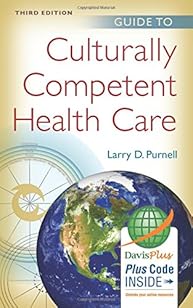
The American Society of Hand Therapists’ Diversity, Equity and Inclusion Committee is pleased to announce the next selection for the ASHT DEI Book Club. After careful consideration and thoughtful suggestions, the committee has selected a compelling and thought-provoking read that we believe will foster rich discussions within our community.
November 12, 2025
8 p.m. ET
A Guide to Culturally Competent Healthcare
by Larry Purnell, PhD, RN, FAAN
The author will join the discussion to answer questions from both moderators and participants!
CE Credit: 1.0 continuing education hour, or 0.10 CEUs
Pricing: This event is FREE to members and nonmembers
Description
In A Guide to Culturally Competent Healthcare, Larry Purnell introduces the Model for Cultural Competence, a comprehensive framework designed to enhance cultural awareness and sensitivity among healthcare professionals. The model identifies 12 cultural domains: overview/heritage, communication, family roles and organization, workforce issues, bicultural ecology, high-risk behaviors, pregnancy and childbearing practices, death rituals, spirituality, healthcare practices and healthcare practitioners.
The book serves as an educational resource to support intercultural learning in healthcare settings. It emphasizes the importance of recognizing and respecting cultural differences in order to provide effective, compassionate and patient-centered care to individuals from diverse backgrounds.
About the Author
Larry Purnell, PhD, RN, FAAN, is a distinguished educator and author in the field of nursing, known for his significant contributions to the development of cultural competence in healthcare. Dr. Purnell’s expertise extends to reaching and research, with a focus on transcultural nursing and the Purnell Model for Cultural Competence, which has been translated into multiple languages and is widely used in educational settings. His textbook, Transcultural Health Care: A Culturally Competent Approach won the Brandon Hill and American Journal of Nursing Book Awards.
Dr. Purnell is a fellow in the American Academy of Nursing, Purnell is a Transcultural Nursing Scholar and a member of TCNS since the late 1980s, a Luther Christman Fellow, and is featured on the Rosa Parks Wall of Fame for Teaching Tolerance. He has 100 book chapters and 16 textbooks, two of which are in Spanish and one in Portuguese. He has made presentations throughout the United States as well as in Australia, Colombia, Costa Rica, Great Britain, Scotland, Norway, Italy, Korea, Panama, Russia, Spain, Denmark and Turkey. He is the US representative to the European Union’s Commission on Intercultural Communication that resulted from the Salamanca, Sorbonne, Bologna, and WHO Declarations.
Learning Objectives
Upon completion of this activity, participants will:
- Describe the complex perspectives relating to race, ethnicity, socioeconomic status, ability, gender identity, sexual orientation, religion and life experiences that shape the clinical learning environment, influence clinical decision making and ultimately impact the delivery of patient care.
- Examine the role of discrimination, bias, microaggressions and racism in the ability to deliver equitable care and use increased competency in anti-racism, cultural humility, social justice, racial equity, allyship, disabusing disability, gender/sexuality issues and LGBTQ+ promotion and acceptance to eliminate health disparities and improve health equity.
- Examine organizational climates and attitudes which impose barriers to creating diverse, equitable and inclusive environments.
- Discuss scholarly work with organizational audiences which improves patient education, expands the framework of clinical decision making and contributes to the body of work in diversity, equity and inclusion.
Suggested resources to acquire the book:

